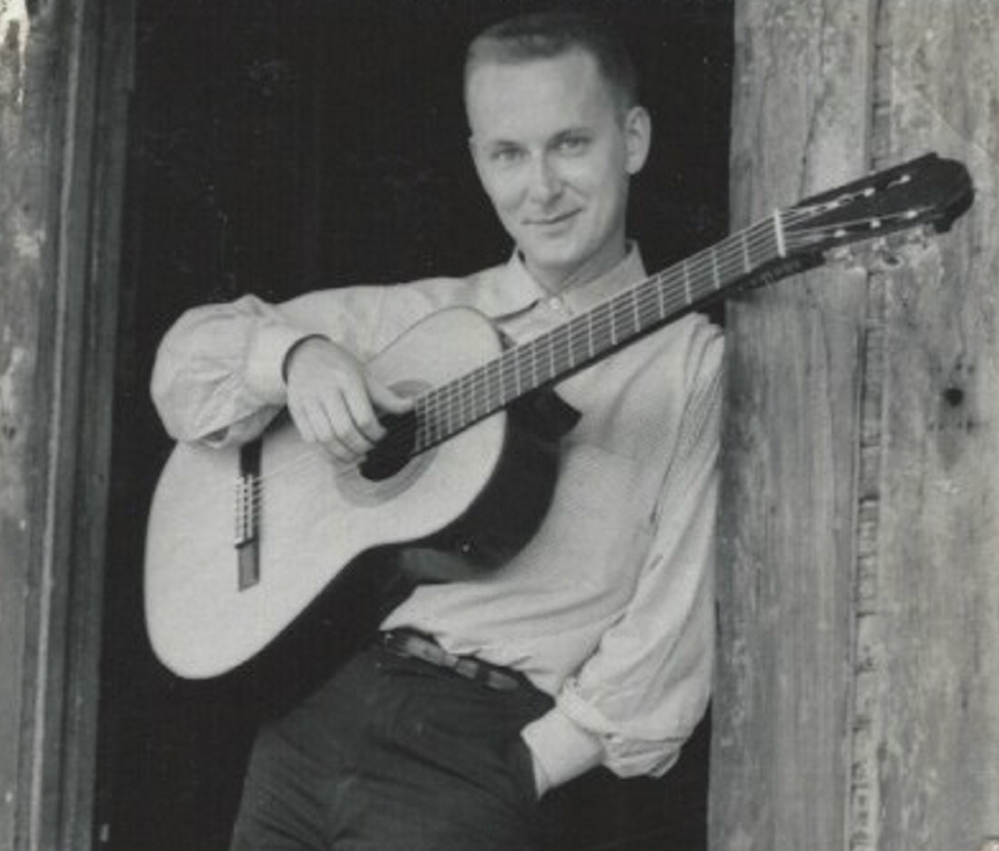Maine native Will Holt, who turned his love and deep appreciation of music into a successful singing/songwriting career, died Sunday at his home in Los Angeles.
Holt, who was born in Portland and spent his summers at his family’s home on Long Lake in North Bridgton throughout his childhood and adult life, was 86 at the time of his death.
Holt’s son, Courtney Holt of Los Angeles, said his father was a prolific songwriter, many of which were popularized by some of America’s best known performing artists.
Though he may not have been as well known as some other American songwriters and lyricists, his son said his father touched a lot of people through his music.
“He always worked behind the scenes inspiring other people, which I think is really cool,” Holt said.
Will Holt established himself as a folk song performer in the 1950s and 1960s.
In a 2013 interview with Portland Monthly magazine, Holt said he was in Chicago where he was preparing to open for a nightclub act. He said he used a swizzle stick and a glass to tap out the melody for the song that would become known as “Lemon Tree.”
“He had this idea for a very simple song, but it turned out to be a song that a lot of people over the years still feel connected to,” his son said.
“Lemon Tree” which Holt wrote in 1957 became his biggest hit after it was recorded by the musical trio known as Peter, Paul and Mary. Several other artists including the Kingston Trio, The Seekers, Bob Marley and the Wailers, and Trini Lopez also recorded “Lemon Tree.”
“He didn’t always receive a lot of recognition, but folk singers were the storytellers of their generation and they didn’t always get the credit for what they did,” his son said.
Holt, who was born at the former Maine General Hospital in Portland, recognized his musical abilities at a young age after learning how to play the piano at the age of 6.
Holt grew up on Deering Street in Portland’s Parkside neighborhood. He attended Portland schools before enrolling at Phillips Exeter Academy in New Hampshire. Holt also attended Williams College in Massachusetts and The Richard Dyer-Bennet School of Minstrelsy.
LONG LAKE INSPIRATION
Steve Halpert of Portland became a longtime friend of Holt’s after meeting him in high school.
“I can still remember Will sitting in my parents’ living room and playing guitar. He was a very warm, a very dynamic performer,” Halpert said.
Holt’s family brought him to their cottage on Bell’s Point in North Bridgton when he was three months old. The cottage overlooks the top of Long Lake. He returned to the cottage each year, spending countless hours writing and playing music and enjoying the beauty of his home.
“He was in my opinion deeply connected to Maine. It served as his center of gravity. He always felt good whenever he visited Maine,” his son said.
In 1950, Holt fled the United States for Europe where spent a year touring the continent. His European adventures allowed him to seek out real-life experiences and offered him the chance to collect folk songs from various countries, his son said.
Holt married Dolly Jonah Holt, a singer and actress who he toured and recorded music with. They settled in New York City and became part of the West Village’s bohemian community. She died in 1983 from illness.
During his career, Holt interpreted the music of German composer Kurt Weill and Bertolt Brecht in performances and recordings that he did with Martha Schlamme.
Holt recorded songs for several record labels including Coral, Elektra and Atlantic.
Holt made his Broadway debut in 1969 with “Come Summer,” which was directed by Agnes DeMille.
TONY NOMINATION
He enjoyed success with “The Me Nobody Knows,” a rock musical that opened the following year and won him the Drama Desk Award for most promising musical writer. His lyrics for that musical won him a Tony nomination in 1971 for best lyrics.
In 1974, Holt wrote the book for the musical, “Over Here” starring the Andrews Sisters. The Andrews Sisters were a three-sisters singing group from the Swing and Boogie-Woogie eras. “Over Here” provided a nostalgic look at the home front during World War II.
He worked with Linda Hopkins in 1975 to write “Me and Bessie,” a revue of the life and career of blues singer Bessie Smith.
In 1988, he won the Los Angeles Dramalogue Critics Award for “A Walk on the Wild Side,” for which he wrote the book, music and lyrics.
He is survived by his wife, Dion Alden, and his son. A memorial service has been tentatively set for June 28 at the North Bridgton Cemetery.
Send questions/comments to the editors.



